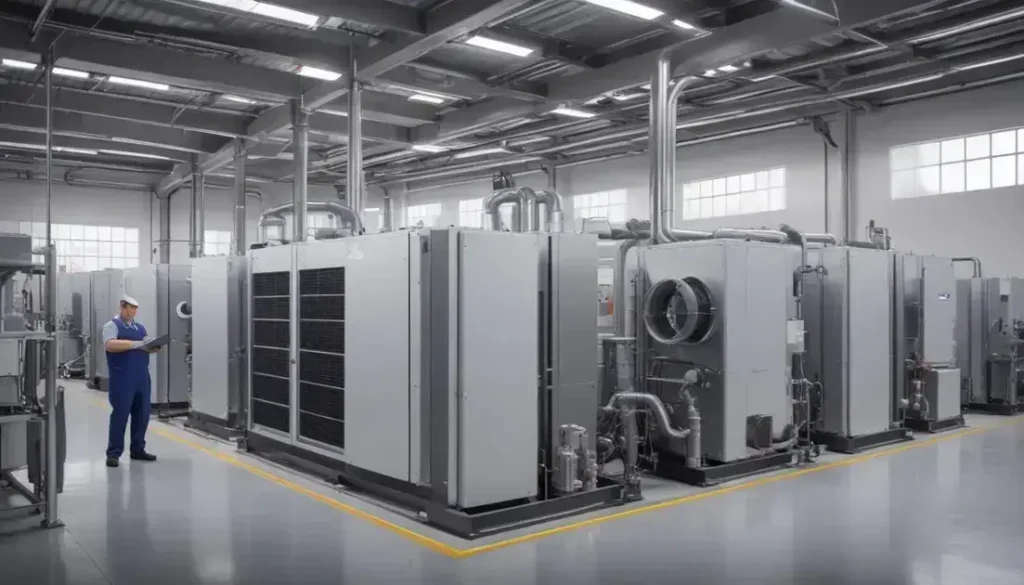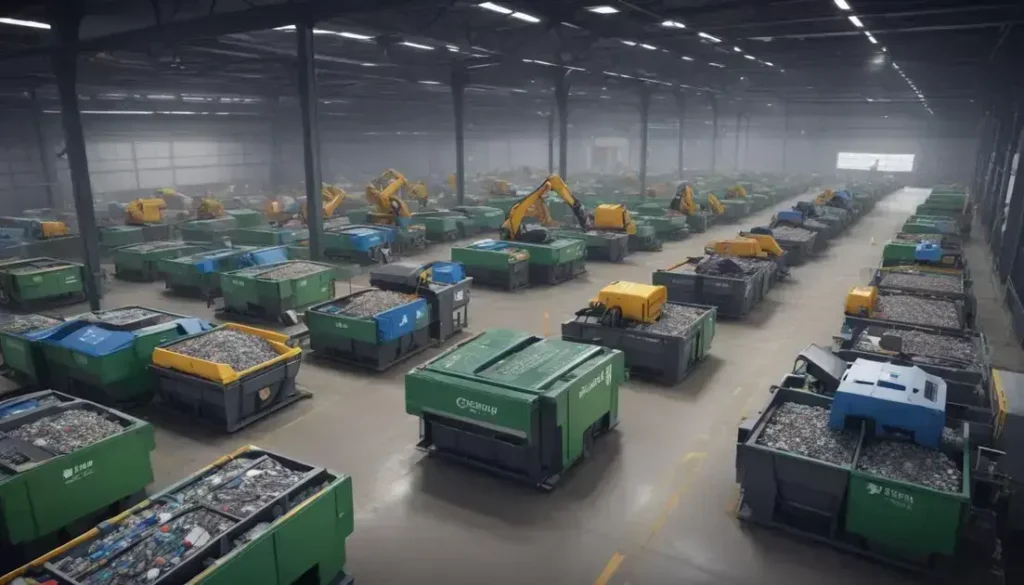Sustainable manufacturing focuses on reducing environmental impacts through advanced technologies, efficient resource use, and the circular economy, enabling companies to meet consumer demand for eco-friendly products while enhancing operational efficiency and profitability.
In today’s rapidly evolving landscape, **sustainability** has emerged as a critical focus for manufacturers. Eaton’s strategies are redefining this domain, and exploring their impact is essential for understanding modern operations.
Eaton’s innovative approach to manufacturing
Eaton has taken a transformative approach to manufacturing by integrating sustainable practices into its operations. This strategy not only enhances efficiency but also contributes to reducing the overall environmental impact. By leveraging innovative technologies, Eaton empowers manufacturers to develop greener solutions that align with global sustainability goals.
One cornerstone of Eaton’s approach is the Factories as a Grid concept, which allows manufacturing facilities to operate as dynamic energy hubs. This system maximises the use of renewable energy sources, such as solar and wind, while enabling real-time energy management. As a result, facilities can reduce energy costs and enhance reliability.
Additionally, the incorporation of advanced digital tools provides manufacturers with valuable insights into their energy consumption patterns. By analysing this data, businesses can identify opportunities for further energy efficiency improvements and participate in demand response programs, which can be financially beneficial.
Ultimately, Eaton’s innovative methodologies not only drive competitive advantage but also showcase a commitment to a sustainable and environmentally friendly manufacturing sector, setting a benchmark for others to follow.
Impact of renewable energy integration
The integration of renewable energy into manufacturing processes has drastically altered the landscape of production. By harnessing sources such as solar, wind, and hydroelectric power, companies can significantly reduce their carbon footprints and achieve greater sustainability.
One of the primary benefits of renewable energy integration is the reduction of operational costs. With volatile fossil fuel prices, renewable sources provide a more stable and predictable energy cost structure. This cost-effectiveness enables manufacturers to invest in other essential areas, such as innovation and workforce development.
Additionally, renewable energy enhances the resilience of manufacturing facilities. By diversifying energy sources, companies can reduce dependence on grid supplies, ensuring uninterrupted production during outages or disruptions. This capability is particularly vital in today’s fast-paced market.
Moreover, as consumers increasingly demand sustainable practices, integrating renewable energy positions companies as leaders in their industries. This not only improves brand reputation but also opens opportunities in emerging eco-conscious markets, allowing firms to thrive in an environmentally aware climate.
The role of digital management in sustainability
Digital management plays a crucial role in enhancing sustainability within manufacturing processes. By leveraging advanced software and cloud-based technologies, companies can monitor and optimise their resource consumption in real-time. This capability significantly reduces waste and enhances operational efficiency.
One primary function of digital management systems is data collection. These systems aggregate data from various sources, allowing manufacturers to gain insights into their energy usage and material flow. With this information, manufacturers can identify inefficiencies and make informed decisions to mitigate their environmental impact.
Furthermore, digital management fosters collaboration across departments. By integrating various functions within the supply chain, stakeholders can work together to implement sustainable practices. This holistic approach ensures that sustainability initiatives are consistent and effective throughout the organisation.
Predictive analytics, another facet of digital management, enables companies to forecast future resource needs and potential sustainability challenges. By anticipating changes, manufacturers can adjust their strategies accordingly, ensuring they remain competitive while upholding their commitment to environmental stewardship.
Benefits of the Factories as a Grid approach
The Factories as a Grid approach offers several key benefits to manufacturers striving for greater efficiency and sustainability. This innovative model transforms traditional production facilities into dynamic energy hubs, allowing them to generate, consume, and share energy more effectively.
One major advantage is the potential for significant cost savings. By generating energy on-site through renewable sources, factories can reduce their reliance on external electricity supplies, thus lowering utility bills. This not only enhances profit margins but also fosters energy independence.
Additionally, the Factories as a Grid model enhances resilience against power outages and market fluctuations. Facilities can store excess energy generated during peak production times and use it during periods of high demand or grid instability. This flexibility leads to increased operational continuity and security.
Moreover, this approach aligns with global sustainability goals. By optimising energy use and incorporating renewable sources, manufacturers can significantly reduce their carbon emissions. This commitment to environmental responsibility enhances brand reputation and meets the growing consumer demand for sustainable practices.
Case study: Eaton’s Arecibo plant
The Eaton Arecibo plant serves as a compelling case study in modern manufacturing practices that prioritise sustainability and efficiency. Located in Puerto Rico, this facility exemplifies Eaton’s commitment to combining renewable energy sources with advanced manufacturing technologies.
One notable feature of the Arecibo plant is its integration of solar energy. The facility harnesses solar panels to generate a significant portion of its energy needs, reducing reliance on traditional power sources. This strategy not only lowers operational costs but also diminishes the plant’s carbon footprint.
Additionally, the plant employs smart technologies to monitor and optimise its energy consumption. By using advanced data analytics, the Arecibo facility can identify patterns in energy use, allowing for more informed decisions regarding resource allocation. This approach enhances overall productivity and sustainability.
The results of these initiatives are impressive. The Arecibo plant has achieved substantial reductions in energy costs while increasing its operational resilience. Furthermore, this location serves as a model for other manufacturers aiming to implement sustainable practices, demonstrating that it is possible to align profitability with environmental stewardship.
The significance of real-time energy data
The significance of real-time energy data in manufacturing cannot be overstated. This data enables facilities to monitor energy consumption continuously, allowing for immediate adjustments that enhance efficiency and reduce costs. By implementing advanced monitoring systems, manufacturers can gather insights that drive informed decision-making.
With access to detailed energy usage information, companies can identify trends in consumption patterns. This knowledge is crucial for detecting anomalies or inefficiencies that may indicate equipment failure or excessive waste. As a result, manufacturers can take proactive measures to address these issues before they escalate, ultimately saving both time and resources.
Additionally, real-time energy data plays a vital role in supporting sustainability goals. By analysing energy consumption in real time, manufacturers can align their practices with environmental standards. This data-driven approach enables companies to implement strategies that reduce their carbon footprint while maintaining productivity.
Furthermore, real-time insights foster a culture of accountability within organisations. Employees become more aware of their energy usage, which can inspire them to adopt more sustainable practices. Overall, the integration of real-time energy data into manufacturing processes is essential for driving efficiency, sustainability, and improved operational performance.
Resilience during grid disruptions
Resilience during grid disruptions is essential for modern manufacturing operations. Manufacturers face myriad challenges, such as power outages or fluctuations in grid stability, which can lead to costly downtime. To mitigate these risks, many facilities are adopting strategies that enhance their ability to remain operational even in adverse conditions.
One effective approach is the integration of backup energy systems. These systems, such as battery storage or distributed generation sources like solar panels, provide a reliable power supply in the event of grid failures. By generating and storing energy on-site, manufacturers can ensure that critical processes continue without interruption.
Moreover, implementing smart energy management systems allows for real-time monitoring and control of energy resources. These systems can automatically switch to backup power sources when grid disruptions occur, ensuring a seamless transition that minimises production delays.
Additionally, the incorporation of predictive analytics can help manufacturers anticipate potential grid issues. By analysing historical data, facilities can forecast disruptions and take preemptive measures to bolster their resilience. This proactive stance not only enhances operational stability but also supports a larger commitment to sustainability in energy usage.
Electric fleet charging infrastructure
The establishment of a robust electric fleet charging infrastructure is essential for supporting the transition to electric vehicles (EVs) in the manufacturing sector. As the demand for sustainable transport solutions grows, businesses are increasingly investing in charging technologies to ensure operational efficiency.
One of the primary benefits of a strong charging infrastructure is the ability to minimise downtime. By strategically placing charging stations on-site, manufacturers can keep their electric fleets operational without significant interruptions. This proactive approach ensures that vehicles are charged and ready for use whenever needed, enhancing productivity.
Moreover, integrating smart charging solutions into the infrastructure allows for optimised energy use. These systems can schedule charging during off-peak hours when electricity rates are lower, thus reducing operational costs. Additionally, smart technology enables real-time monitoring, helping facilities manage energy consumption more effectively.
Furthermore, the implementation of a comprehensive charging network supports sustainability goals by reducing carbon emissions associated with transportation. As manufacturers lead the way in adopting electric fleets, they set a positive example in industry-wide efforts to improve environmental responsibility and promote cleaner energy solutions. This alignment with global sustainability initiatives not only benefits the environment but also enhances brand reputation.
Decarbonisation and its business implications
Decarbonisation represents a critical shift for businesses, particularly in the manufacturing sector. As governments and consumers increasingly demand environmentally responsible practices, companies must rethink their operations to reduce carbon emissions. This transition towards a low-carbon economy presents both challenges and opportunities.
One significant implication of decarbonisation is the need for investment in new technologies. Manufacturers are exploring innovative solutions such as energy-efficient machinery, renewable energy sources, and improved processes to lower their carbon footprint. These investments not only help in compliance with local regulations but also enhance operational efficiency.
In addition to technology upgrades, businesses must embrace sustainable supply chain practices. This involves collaborating with suppliers who prioritise environmental responsibility and adopting sustainable sourcing methods. Such approaches not only contribute to carbon reduction but can also foster long-term partnerships and competitiveness.
Furthermore, decarbonisation can lead to improved brand reputation. Companies committed to sustainability are more likely to attract environmentally conscious consumers and enhance their market positioning. Ultimately, while the shift towards decarbonisation may require significant changes, it also opens avenues for growth and innovation in a rapidly evolving market.
Strategies for energy cost reduction
Implementing effective strategies for energy cost reduction is vital for manufacturers looking to improve their bottom line. Energy expenses can be a significant part of operational costs, making it essential to apply measures that minimise consumption while maintaining productivity.
One effective method is the adoption of energy-efficient technologies. Upgrading to modern equipment, such as LED lighting and high-efficiency motors, can greatly decrease energy usage. These improvements not only reduce costs but also extend the lifespan of machinery, resulting in further savings.
Another strategy is to implement energy management systems. These systems monitor and analyse energy consumption patterns, allowing businesses to identify areas where energy is wasted. By making data-driven decisions, manufacturers can optimise their processes for better efficiency.
Additionally, engaging employees in energy-saving initiatives can enhance results. Providing training and incentives for team members encourages a culture of sustainability. Employees often have valuable insights into potential savings within their daily operations, making them crucial allies in this effort.
Finally, exploring demand response programs can be beneficial. By adjusting operations during peak demand times, manufacturers can take advantage of lower energy rates and contribute to grid stability, making energy use more efficient overall.
Eaton’s role in the global manufacturing landscape
Eaton plays a significant role in the global manufacturing landscape, driving innovation and sustainability across various sectors. As a leader in electrical and industrial solutions, Eaton provides technologies that enhance productivity and efficiency, enabling manufacturers to meet the evolving demands of a competitive marketplace.
One of Eaton’s key contributions is its commitment to sustainable practices. By developing energy-efficient products and solutions, the company helps manufacturers reduce their carbon footprints. This is particularly important as global pressure mounts for organisations to embrace sustainability and align with environmental regulations.
Furthermore, Eaton is at the forefront of digital transformation within manufacturing. Through the integration of smart technologies and data analytics, Eaton empowers manufacturers to optimise their operations, improve supply chain management, and enhance overall performance. This technological advancement is critical for businesses seeking to remain competitive in an increasingly digital world.
Additionally, Eaton’s global presence allows it to respond effectively to regional market needs while sharing best practices across borders. This adaptability fosters innovation and collaboration, positioning Eaton as a vital partner for manufacturers looking to thrive in a complex manufacturing ecosystem. Overall, Eaton’s influence extends beyond products, shaping the future of manufacturing through its focus on sustainability and technological advancement.
Challenges faced by manufacturers today
Manufacturers today face a myriad of challenges that impact their operational efficiency and profitability. One significant hurdle is the increasing complexity of supply chains. Global disruptions, such as trade conflicts and the aftermath of the pandemic, have revealed vulnerabilities in traditional supply chain models, prompting manufacturers to seek more resilient solutions.
Moreover, the rising costs of raw materials and energy pose serious challenges. As prices fluctuate, maintaining profitability becomes arduous, forcing manufacturers to implement strategic cost management practices. Finding ways to optimise production without compromising quality is essential in this volatile landscape.
Another pressing challenge is technological advancement. As the manufacturing sector shifts towards digitalisation, businesses must invest in new technologies to stay competitive. However, integrating these technologies often requires substantial capital and a skilled workforce. The lack of qualified talent can hinder innovation and productivity.
Additionally, manufacturers are increasingly pressured to adopt sustainable practices in response to climate change and consumer demand for environmentally responsible products. Balancing sustainability goals with operational demands presents a multifaceted challenge that requires strategic planning and execution.
Future outlook for sustainable manufacturing
The future outlook for sustainable manufacturing is promising, driven by advancements in technology and increasing global awareness of environmental issues. As manufacturers recognise the importance of minimising their carbon footprints, they are likely to adopt more eco-friendly practices and innovative solutions to enhance sustainability.
Emerging technologies, such as artificial intelligence and the Internet of Things (IoT), will play a crucial role in transforming manufacturing processes. These technologies can optimise resource use, reduce waste, and improve energy efficiency, leading to lower operational costs and enhanced sustainability.
Additionally, the circular economy model is expected to gain traction. This approach focuses on reusing materials and minimising waste, presenting manufacturers with opportunities to innovate in product design and production processes. By embracing a circular economy, businesses can not only contribute to environmental conservation but also create new revenue streams.
Furthermore, consumer demand for sustainable products will continue to shape the manufacturing landscape. As more consumers choose eco-friendly options, companies that prioritise sustainability in their operations are likely to gain a competitive advantage. Overall, the future of sustainable manufacturing looks bright, characterised by innovation, efficiency, and a strong commitment to environmental responsibility.
In conclusion, the future of sustainable manufacturing looks bright
As companies continue to embrace eco-friendly practices, the integration of technology and innovative approaches will be key to their success. By focusing on sustainability, manufacturers can reduce their environmental impact and improve their bottom line.
Technologies like artificial intelligence and the Internet of Things will empower businesses to streamline operations, lower costs, and create products that meet consumer demand for sustainability. The shift towards a circular economy further highlights the importance of reusing materials and minimising waste.
Overall, the commitment to sustainable manufacturing not only positions companies as leaders in their industries but also contributes to a healthier planet. By taking proactive steps today, businesses can build a better tomorrow for everyone.
Frequently Asked Questions
What are the main benefits of sustainable manufacturing?
Sustainable manufacturing reduces environmental impact, lowers operational costs, and enhances brand reputation. It also meets consumer demand for eco-friendly products.
How can technology improve sustainability in manufacturing?
Technologies like AI and IoT can optimise energy use, reduce waste, and streamline operations, thus improving overall efficiency and sustainability.
What is a circular economy and how does it apply to manufacturing?
A circular economy focuses on reusing materials and minimising waste. In manufacturing, this means designing products that can be easily recycled or reused.
How can manufacturers prepare for the shift towards sustainable practices?
Manufacturers can start by assessing their current processes, identifying areas for improvement, and investing in energy-efficient technologies and training for staff.
Why is consumer demand for sustainable products important for manufacturers?
Consumer demand drives manufacturers to adopt sustainable practices, as customers increasingly prefer eco-friendly products. Meeting this demand can enhance sales and brand loyalty.
What challenges do manufacturers face when transitioning to sustainability?
Challenges include rising costs of renewable technologies, the complexity of supply chains, and the need for skilled workers to implement new practices and technologies.


